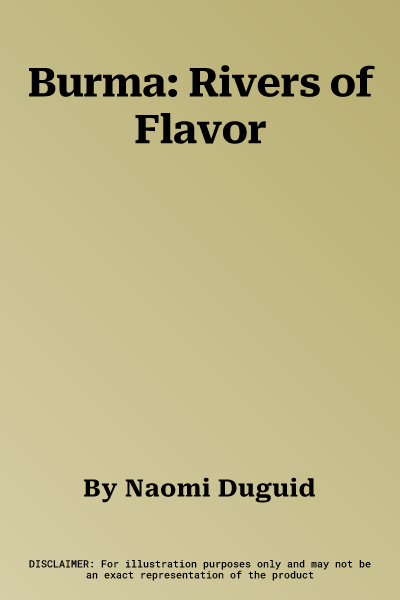IACP Award Winner
Naomi Duguid's heralded cookbooks have always transcended the category
to become "something larger and more important" (Los Angeles Times).
Each in its own way is "a breakthrough book . . . a major contribution"
(The New York Times). And as Burma opens up after a half century of
seclusion, who better than Duguid--the esteemed author of Hot Sour
Salty Sweet--to introduce the country and its food and flavors to the
West.
Located at the crossroads between China, India, and the nations of
Southeast Asia, Burma has long been a land that absorbed outside
influences into its everyday life, from the Buddhist religion to
foodstuffs like the potato. In the process, the people of the country
now known as Myanmar have developed a rich, complex cuisine that mekes
inventive use of easily available ingredients to create exciting flavor
combinations.
Salads are one of the best entry points into the glories of this
cuisine, with sparkling flavors--crispy fried shallots, a squeeze of
fresh lime juice, a dash of garlic oil, a pinch of turmeric, some
crunchy roast peanuts--balanced with a light hand. The salad tradition
is flexible; Burmese cooks transform all kinds of foods into salads,
from chicken and roasted eggplant to spinach and tomato. And the
enticing Tea-Leaf Salad is a signature dish in central Burma and in the
eastern hills that are home to the Shan people.
Mohinga, a delicious blend of rice noodles and fish broth, adds up to
comfort food at its best. Wherever you go in Burma, you get a slightly
different version because, as Duguid explains, each region layers its
own touches into the dish.
Tasty sauces, chutneys, and relishes--essential elements of Burmese
cuisine--will become mainstays in your kitchen, as will a chicken
roasted with potatoes, turmeric, and lemongrass; a seafood noodle
stir-fry with shrimp and mussels; Shan khaut swei, an astonishing
noodle dish made with pea tendrils and pork; a hearty chicken-rice soup
seasoned with ginger and soy sauce; and a breathtakingly simple dessert
composed of just sticky rice, coconut, and palm sugar.
Interspersed throughout the 125 recipes are intriguing tales from the
author's many trips to this fascinating but little-known land. One such
captivating essay shows how Burmese women adorn themselves with
thanaka, a white paste used to protect and decorate the skin. Buddhism
is a central fact of Burmese life: we meet barefoot monks on their
morning quest for alms, as well as nuns with shaved heads; and Duguid
takes us on tours of Shwedagon, the amazingly grand temple complex on a
hill in Rangoon, the former capital. She takes boats up Burma's huge
rivers, highways to places inaccessible by road; spends time in village
markets and home kitchens; and takes us to the farthest reaches of the
country, along the way introducing us to the fascinating people she
encounters on her travels.
The best way to learn about an unfamiliar culture is through its food,
and in Burma: Rivers of Flavor, readers will be transfixed by the
splendors of an ancient and wonderful country, untouched by the outside
world for generations, whose simple recipes delight and satisfy and
whose people are among the most gracious on earth.

